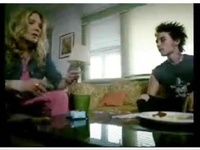Juicebox
The Strokes
What do you get when you combine five swaggering New York hipsters, rooftop lesbian soft porn, nausea-inducing taxi-cab cunnilingus, and a dirty bathroom stall hookup? There are two possibilities: Finals Club initiation season, or the music video for “Juicebox,” the newest pomp-rock mashup by the Strokes, those loveably trendsetters widely known as the saviors of indie swagger.
And let me tell you, my friends, the “Juicebox” video has enough bravado to fill a bathtub or two. Over a pilfered bass riff, the video bounces between the requisite studio shots and semi-randomized staged hook-up hijinks. Really, “bounces” is an understatement: the slew of sexual scenarios trotted out before our eyes are enough to dizzy the hardiest of fans.
Images of a B-movie shot atop an apartment building are interspersed with those of an old woman scrubbing the floor on hands and knees, and both are equally titillating to unfunny sometime-comedian David Cross, whose inclusion in the video merely serves to justify indie sex and swagger.
The sexually dubious hotness only furthers the confusion one feels about the band’s new sound. The band speeds up to a climax that seems to say “Look, we have heard the Vines before,” only to slow down to the familiar Reptilian garble that we love to pretend not to love. New Strokes? Old Strokes? Which is better? More posturing, more cool outfits, more “We are so random, no?”
The video is almost rescued when some drunken oral ambition goes horribly awry, but that’s only because it reminded me of a similar experience my roommate had last year. I soon got over my nostalgia, realizing that nothing could salvage such annoying self-obsession: not hot lesbian make-out sessions, not Fab Moretti banging on a drum, not even text message bathroom fellatio invitations. Sad, perhaps, but, in their own words, “that’s the way it is.”
—Henry M. Cowles
Jesus of Suburbia
Green Day
Green Day seem to want nothing more than to be taken seriously these days, after a decade of alienating their early fans with vapid pop punk. This insneeriority complex has played itself out in their recent videos.
For “Wake Me Up When September Ends,” the band took on war and lost innocence. With their most recent six-minute-plus epic, “Jesus of Suburbia,” they focus on a subject nearer and dearer to them: love and loss among the over-eyelinered.
The video’s protagonist, who hubristically claims in subtitled dialogue to be “nailed to a couch, suffering for [his] sins,” is “St.” Jimmy. He has the classic underfed, spiky-black sneering punk look rarely seen past the 1970s (but frequently outside the Harvard Square T stop).
His friends are freaks, but they have a quiet dignity, which the video conveys by panning over their faces as they stare profoundly into middle distance. His girlfriend resembles Brittany Murphy on a cocaine-and-makeup binge.
The first part of the video depicts Jimmy’s life as a hazy, jumpily filmed swirl of sex, drugs, rock-’n’-roll, hating his mom, and watching Green Day perform “Jesus of Suburbia” on TV (so meta it hurts). This thrilling lifestyle is cut short about halfway through the video, as his girlfriend leaves him; he gets into fights, and assumes a general aura of angst.
Never fear, for Jimmy’s life rebounds by the bridge of the song; at least the director has a vague acquaintance with the track, more than can be said for most “story” videos. In an unprecedented display of teenage rebellion, Jimmy runs away from home, but not before scrawling “St. Jimmy” in lipstick on a bathroom wall, cutting his palm with a dirty razor blade, and leaving a bloody handprint underneath.
While it may lay claim to higher legitimacy, all “Jesus of Suburbia” really teaches is that giving yourself blood poisoning is a superb way to stick it to the man, and that you can never wear enough eye makeup.
—Lisa J. Bloomberg
Beat of My Heart
Hilary Duff
I remember when Hilary Duff was merely a slightly chubby Disney Channel pre-teen who wore head scarves and eight ponytails at one time. I traced the progress of Hilary’s various stages of development with a smile plastered to my face, convinced of her moral superiority to the other teen pop-tarts emblazoned in my heart.
That’s why her new video, “Beat of My Heart,” is especially poignant. Hilary was once so normal, so vaguely blonde and portly. Now she looks like she is in the later stages of a voracious coke addiction and is dating a 26-year-old who wears eyeliner. It is, omg, so sad.
My disappointment is particularly acute because “Beat of My Heart” originally got my hopes up. The video starts with a picture of an actual beating heart; tangible metaphors clearly explicated in the song are a hallmark of Duff’s artistic oeuvre.
Even when this image transitions to Duff mouthing the words, “beat of my heart” to the camera, I was still wicked psyched, anticipating the mature flowering of her pristine computer-generated voice. But when the camera transitioned to Hilary, I was horrified. Gone was the nondescript blonde of “So Yesterday.” She has become believable as a cinematic illustration of the dangers of cocaine and she’s toting totally whack hipster outfits.
The new Hilary and her baby-giraffe thighs parade through the second section of the video in said outfits with a clear microphone in her hand, shaking her head in a woefully uncoordinated manner.
She then sits in a see-through chair (wearing a powder blue headband) while the silhouettes of whatever long-haired sell-outs she co-opted into her band banged on see-through instruments. It’s all very mod, minus any pretense of legitimacy.
The bridge signals a radical change in tone. The three chords employed throughout (bold minimalist statement or banal pop trash?) suddenly turn minor, and Hilary starts yelling “Away! Away!” for no discernible reason. To add visual insult to aural injury, all of this takes place while Hilary dances in front of a shadow puppet of a speedometer.
This disturbing interlude is resolved by Duff going through a full fashion show of all of the positively fab looks she has sported in the video, to chilling effect. After a close up of her whittled cheek-bones, she dramatically sighs at the camera and ends the song, all traces of the ruddy prepubescent she used to be vanishing under the harsh lights of fame.
—Rebecca M. Harrington
Read more in Arts
Light Touches Sparkle in 'You Never Can Tell'















